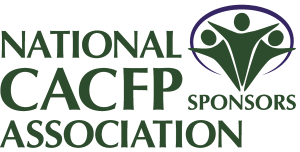Final Rule: Child Nutrition Program Integrity
August 28, 2023

The USDA released a final rule on child nutrition program integrity to ensure that child nutrition programs are properly operated and managed. This rule is one of many steps that USDA is taking to ensure that federal child nutrition programs can serve the millions of children who depend on them to reach their full potential.
Why It Matters
Program integrity is important in ensuring that the CACFP functions properly and that the children and adults in CACFP-participating care receive the nutritious meals they need for their proper development and health. The provisions implemented by the final rule will increase oversight and accountability for those who operate the CACFP.
Summary
The following is a high-level summary of items included in the final Program Integrity rule as it relates to CACFP and SFSP. For more information, read the Final Rule Child Nutrition Program Integrity, USDA summary guidance CACFP 10-2023, or visit USDA’s Program Integrity Final Rule webpage. Please note that many of the Serious Deficiency provisions that were suggested in the Child Nutrition Program Integrity Proposed Rule have not been codified in this final rulemaking. Instead, another proposed rule is expected to be released this fall, 2023, that will address the Serious Deficiency process and will be open for public comment.
New Provisions
- Financial Review of Sponsoring Organizations:
- Requires State agencies to annually verify bank account activity and actual expenditures by sponsoring organizations in CACFP by comparing at least 1 month of sponsoring organizations’ bank account activity and actual expenditures
- Requires State agencies to annually review CACFP expenditures reported by sponsoring organizations of unaffiliated centers
- Requires State agencies to conduct at least one review every 2 years of select institutions
- Requires State agencies to pay all valid claims with non-Federal funds if it fails to provide a fair hearing within 60-days
- Allows fines to be assessed to State agencies and School Food Authorities (SFAs) for severe or repeated non-criminal violations in any Child Nutrition Program
- Defines “Termination of Convenience”
Effective date: September 22, 2023
Compliance date: August 23, 2024.
- Requires sponsoring organizations to enter into permanent agreements with their unaffiliated centers
Effective date: September 22, 2023
Compliance date: September 22, 2023.
Previously Implemented Provisions
The following provisions have been previously implemented through USDA guidance, as noted, and this rulemaking is simply putting them into official regulation. These should not impact CACFP operators differently and include:
- Eliminates an annual application for Institutions CACFP 19-2011
- Requires variation of timing of unannounced reviews CACFP 16-2011
- Allows tier II day care homes to collect household income information and transmit it to the sponsoring organization CACFP 17-2011
- Simplifies the calculation of monthly administrative reimbursement of sponsoring organizations of day care homes CACFP 06-2011
- Allows carry over of up to 10 percent of a day care home sponsoring organization’s administrative funding from the previous Federal fiscal year into the next fiscal year CACFP 18-2011, CACFP 11-2012, and CACFP 24-2012
- Allows State agencies to request CACFP to increase audit funding from 1.5 percent to a maximum of 2 percent of CACFP funds used by the State agency CACFP 10-2016
Effective date: September 22, 2023
Compliance date: September 22, 2023.
Further Explanation of New Provisions
Financial Review of Sponsoring Organizations in CACFP
Annual Financial Review of all Sponsoring Organizations: This final rule requires State agencies to annually verify bank account activity and actual expenditures by sponsoring organizations in the CACFP. The State agency must select and compare at least 1 month of a sponsoring organization’s CACFP bank account activity with other documents that are adequate to support that the financial transactions meet program requirements.
Edit checks can be conducted electronically and remotely, once the necessary supporting financial documentation is received by the State agency reviewer. The State agency has the discretion to obtain statements of bank account activity with the annual budget submission, as part of the application renewal, or through a monitoring review. No changes were made to the review content, application procedures, or budget approval requirements.
and an Annual Financial Review of Sponsoring Organizations of Unaffiliated Centers: This rulemaking requires State agencies to annually review CACFP expenditures reported by sponsoring organizations of unaffiliated centers. Sponsoring organizations must annually report the amount of program expenditures of program funds and the amount of meal reimbursement funds retained from their unaffiliated centers for administrative costs.
Additional Recommendation: Although FNS does not require it in CACFP, maintaining a separate bank account for Child Nutrition Program funds is a recommended practice.
Who’s Impacted: State Agencies, all CACFP Sponsors and specifically CACFP Sponsor of Unaffiliated Centers
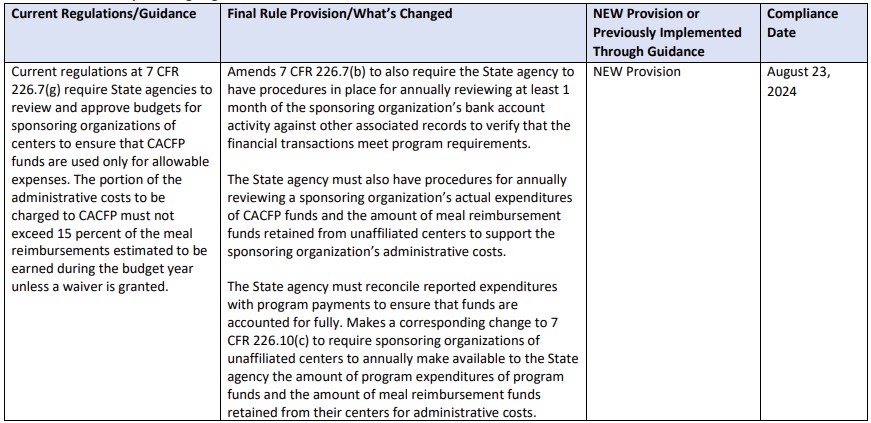
State Agency Review Requirements in CACFP
The final rule requires State agencies to conduct at least one review every 2 years of sponsoring organizations that:
- Sponsor more than 100 facilities, as currently required;
- Engage in any activities other than those related to CACFP;
- Have received findings from a recent review that detected serious management problems; or
- Are at risk of having serious management problems.
Who’s Impacted: State Agencies, Large Sponsors, Sponsors that engage in non-CACFP activities, and Sponsors at risk of management problems
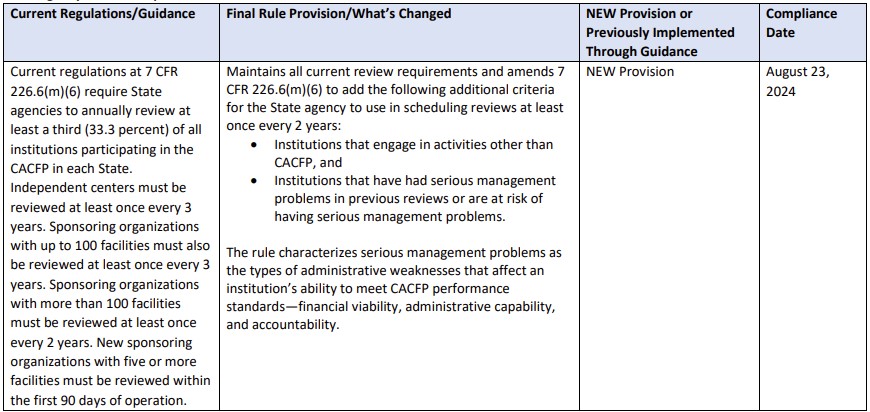
State Liability for Payments to Aggrieved Child Care Institutions
The final rule requires State agencies to pay all valid claims with non-Federal funds if the State agency fails to meet the required 60-day timeframe for providing a fair hearing and a prompt determination following an administrative review request, unless FNS grants an exception. This rule shifts the financial burden from child care institutions to State agencies. FNS intends to provide technical assistance materials on developing processes for tracking and notifying State agencies when they would become liable for payments and best practices for working with hearing officials to emphasize the importance of adhering to a timeline in rendering their decisions.
Who’s Impacted: State Agencies
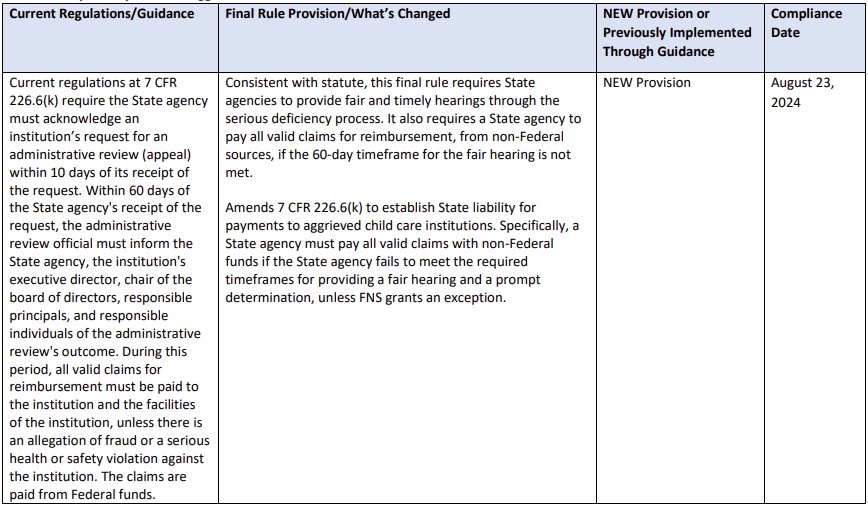
Standard Agreements Between Sponsoring Organizations and Sponsored Centers
Current regulations require the sponsoring organization to enter into a written permanent agreement with each sponsored day care home, which specifies the rights and responsibilities of both parties. However, there is no standard form of agreement and no requirement that sponsoring organizations establish agreements with sponsored centers.
This final rule requires sponsoring organizations to enter into permanent agreements with their unaffiliated centers (centers, ARAS, OSSHC, Adult centers). The standard agreement requires the center to:
- Allow visits by sponsoring organizations or State agencies to review meal service and records;
- Promptly inform the sponsoring organization about any change in its licensing or approval status;
- Meet any State agency approved time limit for submission of meal records; and
- Distribute to parents a copy of the sponsoring organization's notice to parents if directed to do so by the sponsoring organization.
The standard agreement also establishes the right of centers to receive timely reimbursement (within 5 working days) from the sponsoring organizations for meals served.
Who’s Impacted: CACFP Sponsors and Unaffiliated Centers
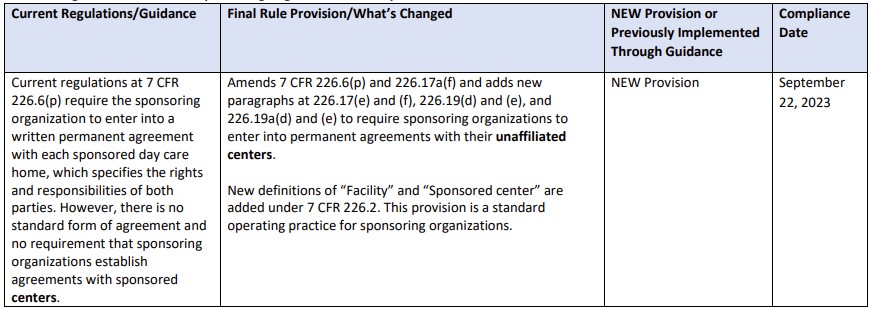
Fines for Violating Program Requirements
State agencies may impose a fine on SFAs or schools, and FNS may impose a fine on a State agency if it is determined that the organization has:
- Failed to correct severe mismanagement of any child nutrition program;
- Disregarded a program requirement of which the SFA, school, or State has been informed; or
- Failed to correct repeated program violations.
Important Clarification: Fines will be applied under exceptional, not routine, circumstances. Fines will only be used for severe or repeated non-criminal violations. A fine would never replace established technical assistance, corrective action, or fiscal action measures to solve common place or unintentional problems.
The final rule allows State agencies to suspend or terminate the participation of an SFA, if the established fine is not paid, and provides the ability to appeal any fine through existing processes. Fines must be paid using non-Federal funds which may include State revenue funds in excess of the 30 percent required match for NSLP, other State appropriated funds, and local contributions to support the programs.
Fine Calculation:
- State Agencies: FNS will calculate the maximum thresholds using all SAE allocations made available to the State agency in the most recent fiscal year for which full year data is available.
- SFAs: State Agencies will calculate the maximum fine using program meal reimbursements from the most recent fiscal year for which full year data is available.
- First Fine: 1% of the amount of meal reimbursement earned for the fiscal year
- Second fine: 5% of the amount of meal reimbursement earned for the fiscal year
- Third Fine: 10% of the amount of meal reimbursement earned for the fiscal year
Required Notice: 30 days prior to issuance of the fine
Due Date: Up to State agencies’ discretion
Who’s Impacted: State agencies, all SFAs including SFA sponsors of SFSP and SFA institutions in CACFP

Termination for Convenience
The final rule defines “Termination for convenience” to clarify that an agreement may be terminated for convenience when a sponsor, institution, facility, or State agency chooses to permanently end program participation, due to considerations unrelated to its performance of program responsibilities. State agency, sponsor, institution, or facility cannot terminate for convenience to avoid implementing the serious deficiency process – any entity that does so will be terminated for cause and disqualified.
NO SUBSTANTIVE CHANGE PROVISION
Informal Purchase Methods for CACFP
This final rule updates procurement standards and guidelines and makes the values of the Federal micro-purchase threshold and Federal simplified acquisition threshold consistent with current guidance on informal purchase methods under 2 CFR part 200. This modification eliminates the need to revise CACFP regulations each time the thresholds are adjusted for inflation.
This rulemaking also streamlines CACFP procurement standards and provides clarity by removing outdated or duplicative provisions of the regulations that have been replaced by 2 CFR part 200.
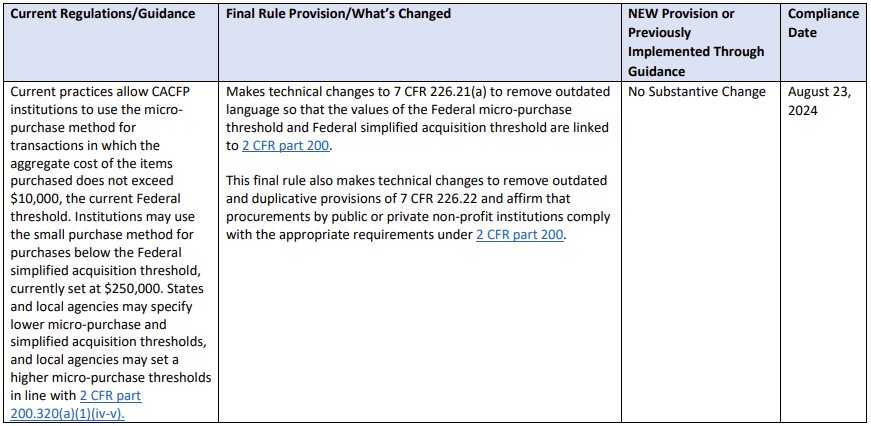
What Does This Mean For Your Program?
To learn more about the new provisions created by the final rule, NCA members are invited to join us for a webinar on September 7 from 2:00pm – 3:00pm Eastern for a review of the new provisions along with an opportunity for Q&A.
For more information, read the Final Rule Child Nutrition Program Integrity, read their summary guidance CACFP 10-2023, or visit their Program Integrity Final Rule webpage.
